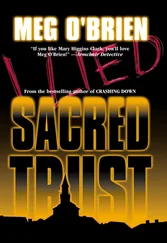That same day is also when the trousseau for the noble wedding must be completed and packed for collection the next morning. Such is the importance of the commission that the abbess herself supervises the process as the chest is brought downstairs to a room close to the infirmary ready for transportation to the river storehouse that afternoon.
In the mortuary, Zuana and Letizia place the girl in a rough wood coffin, covering her body with a length of white muslin (the gold cloth is used only for those who have taken their vows). Zuana then dismisses Letizia—who has been unexpectedly affected by the sight of the bone-thin young body, to the point where she is overcome by tears—and keeps vigil herself during the afternoon work hour.
Halfway through she is joined by the novice mistress, who has humbly gone to the abbess and asked if she might be allowed to say her own private farewell.
The two women kneel by the coffin together. The last time they tended a corpse was at the death of Suora Imbersaga, when Zuana had been so moved by the novice mistress’s febrile joy. Now she cannot help but be aware of a dark turmoil within her fellow choir nun, as if however much she tries she cannot, will not, forgive herself for whatever her part was in this strange young woman’s death.
Eventually, after what feels like hours of prayer, the older woman rises slowly to her feet and makes her way silently to the door.
“Suora Umiliana?”
She stops and waits.
“You told me once that you wished you had been my novice mistress. Well, I share that feeling, and if you would let me I would like to come to you sometimes, to talk more about how I might reach closer to our Holy Father.”
The old woman shivers. “You should not come to me,” she says harshly. “I am not worthy.”
“Oh, but I think you are. Please. I do believe that you might help me.”
And while there are some things in this room that are ripe with deceit, this is not one of them.
Umiliana stares at her, nodding slightly, her white hairs and pitted chin trembling as the tears start to flow.
“I will do my best.”
JUST BEFORE VESPERS the abbess calls the chief conversa to her chambers and asks her to wait until after supper before they move the chest to the storehouse, since she herself would like to make a last check on the contents.
When the nuns disperse to their cells for private prayer, Zuana and the abbess meet in the mortuary. Between them they easily lift the girl’s body out of the coffin and carry it through a now unlocked door to the room where the trousseau chest is waiting. As they place her under layers of embroidered wedding silk, Zuana searches for a pulse. It is steady enough when she finds it, though faint, like that of someone heading toward death. The consensus of the two sources is that a body can remain as if in a state close to death for up to twenty-four hours and still emerge in health. But the first source is an observation from some heathen tribe found in the Levant, and the second, her father’s, relies on descriptions but no living proof. They will just have to hope. At rest the girl looks so fragile, more bone than body still, her hands carefully bandaged with salve beneath. Such a long way from the peach-ripe young beauty who first entered. But then, with the scars of having half his throat cut open, her prospective husband will surely be no prettier.
Before they close the lid, the abbess unwraps something from beneath her cloak and sets it under the young girl’s bandaged hands. It is a jeweled crucifix, less precious than the one she uses for special feast days but rich enough to buy the beginnings of a new life for the person who possesses it. The instructions have already been made clear: on no account should she attempt to sell or pawn it within the city of Ferrara or its dominions. But once the young couple is far enough away, it is theirs to do with as they see fit. No one will question where it came from, and even if they did there will be no record of a precious cross missing from any convent in Ferrara, and certainly none of any escapee who might have stolen it. The novice Serafina will be long dead and buried by then, her obituary, largely indistinguishable from a hundred others, inscribed in the convent necrology by Suora Scholastica’s elegant hand and part of her dowry passed on to the convent.
The girl had listened and understood. “I don’t deserve this,” she had said, staring at the crucifix.
“I don’t know about that, but I fear you will find it hard to live without it.”
Though now, as the two women stand looking down at her, surely the same thought is going through both their heads.
“Because she is so weak I gave her too little rather than too much,” Zuana says quietly. “I pray it will be the right amount.”
Her words put speed into their step and they close the chest (picked for its empty knots, through which a certain amount of air will flow) and return to the mortuary, where they face the problem of how to weigh down the empty coffin enough not to arouse suspicion when it is carried to the chapel and burial plot the next morning.
Zuana has the answer ready. From the dispensary she brings an armful of books and lays them at the bottom.
The abbess stares at her. “We are both sacrificing jewels, it seems.”
Zuana shakes her head. “She is not so heavy—and like you I have greater ones. Many of the remedies in these I have tried and found wanting. The better ones I have already memorized.”
“Good.” She pauses. “Perhaps it would be wise for you to memorize more.”
Zuana feels the hollowness open up inside her. “When? When will it come?”
“I do not know for certain. Her leaving will steady us for a while. But it will happen, for in the end it does not depend on us. If it is not this bishop, it will be the next, or the one after him.” She smiles. “I am sorry.”
But of course Zuana has known it all along. How bad will it be? Though she can fill her mind with information, she will be able to do little with it if they see fit to destroy her choir of cures. She imagines the convent graveyard in the future, with two neatly dug new graves. Perhaps God will see fit to take them both by the time the worst happens.
“Come,” the abbess says briskly. “We had better finish this.”
Together they fashion a softer shape made from the abbess’s old shifts wrapped around the books, then cover the whole thing with the thick muslin. The abbess has already agreed with Father Romero that by the time he comes at dawn to conduct the service the coffin will be nailed down. Until then either Zuana or she herself will keep the night vigil over the “body.”
There is nothing more to do.
“God be with you, Suora Zuana.”
“And with you, Madonna Abbess.”
And so, leaving Zuana with the coffin full of books, Madonna Chiara calls for the chief conversa and supervises as four sturdy younger converse hoist the trousseau chest onto the cart and pull it through the gardens in the fading light down to the storehouse, where it is placed in the outer chamber, ready for the bargemen to find it there the next morning.
HER PALMS THROB. Her palms throb and her throat hurts. Her throat hurts and she cannot breathe well. When she opens her eyes she is blind. In the few seconds it takes her to remember and make sense of where she is, she is gripped by panic, which smothers as powerfully as the layers of heavy fabric that cover her face when she tries to move.
She relaxes her body and tries to breathe more calmly. There is air but it feels thick in her nostrils, and she knows from a thousand stories of premature burial that it cannot last forever.
But she is not buried. She is in the trousseau chest. In the storehouse. And somewhere out there, behind the door, on the river, is a boat even now perhaps pulling up and …
Читать дальше












